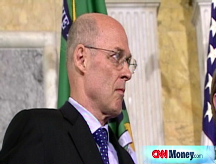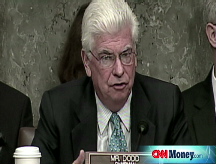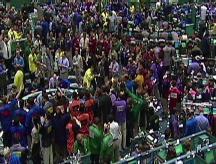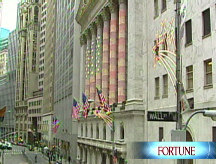Stocks tumble on bailout woes
Wall Street ends a volatile session lower as investors consider the Senate hearing on the proposed bank rescue.

NEW YORK (CNNMoney.com) -- Stocks slumped Tuesday, as the heated debate in Congress on the proposed $700 billion bank bailout dampened hopes that the government would take faster action to mitigate the credit market crisis.
After the close, Goldman Sachs said Warren Buffett's Berkshire Hathaway will invest at least $5 billion in the company through a preferred stock purchase. Goldman shares jumped 8% in extended-hours trading. (Full story).
The Dow Jones industrial average (INDU) lost 162 points, or 1.5%. The Nasdaq composite (COMP) fell 1.2% and the Standard & Poor's 500 (SPX) index fell 1.6%.
In the wake of the worst financial crisis in years, economic officials and lawmakers are meeting on Capitol Hill this week in an attempt to hammer out an historic $700 billion bank rescue plan that would get bad mortgage bets off bank balance sheets and ultimately loosen up the credit markets.
The move is seen as critical for the stability of the financial sector as the 15-month-old credit crisis stretches on.
Treasury Secretary Henry Paulson and Federal Reserve Chairman Ben Bernanke told the Senate Banking Committee Tuesday that fast action is needed to stop a bigger financial meltdown.
Although Congress is expected to announce a deal by the end of the week, some lawmakers Tuesday questioned the size and scope of the current plan - and whether more provisions are needed to protect taxpayers. The House Financial Services Committee holds testimony Wednesday. (Full story)
"The equity and the credit markets are reflecting the uncertainty of whether this will go through," said John Davidson, president and CEO at PartnerRe Asset Management.
Stocks surged at the end of last week as news of the plan spread. But the intensity of the debate this week surprised some investors who were looking for a quick resolution.
"The euphoria last week was predicated on a belief that something would get done," Davidson said. "Right now, the worry is that it won't."
Stocks rose in the morning as the hearing got underway, slipped in the afternoon as the debate heated up, rallied again, and then sold off near the close.
A selloff in oil, gold and other safe-haven commodities caused investors to bail out of the underlying stocks. And General Motors continued to slump on worries about its cash position.
On Monday, the Dow fell 373 points as investors worried about the bailout plan and a jump in the price of oil - which saw its biggest one-day dollar gain ever. It was the fourth consecutive session in which the Dow ended the session with a change of at least 350 points in either direction, demonstrating the extreme volatility of markets.
Wednesday brings the August existing home sales report and the weekly oil inventories report.
Debate heats up: The current proposal would let the Treasury buy up bruised assets held by troubled financial firms at a discount, hold them, and then sell them later for profit. With these bad assets off their balance sheets, the hope is that banks would be willing to lend to each other again, loosening up the credit markets and removing one of the weights on the struggling economy.
However, there are questions about whether the plan would be able to accomplish this, as well as what it will mean for taxpayers and for the inflation outlook.
Secretary Paulson said it is imperative that Congress approve the bailout this week. He said that failure to do so would mean a continued series of bank failures and frozen credit markets, which threaten the health of the economy.
And Bernanke said that failing to bail out the financial industry could mean a bigger economic slowdown, a weaker labor market and more housing market weakness.
"Congress needs to get out of the way and worry about the extras later," said Dean Barber, president at Barber Financial Group. "They need to let the financial sector know they are going to secure the system now."
The uncertainty about the details of the plan is going to keep stocks in a narrow trading range for the next few sessions, said Peter Cardillo, chief market economist at Avalon Partners. But the longer-term outlook for equities will improve as long as some form of the proposal is passed that serves to restore confidence in the credit markets.
"The bottom line is that the market is looking for closure on this, whether it's $700 billion or $1 trillion," Cardillo said.
Financial crisis: The proposal is seen as the most sweeping economic intervention by the government since the Great Depression.
It followed an extraordinary week on Wall Street that began with Lehman Brothers (LEH, Fortune 500) filing the biggest bankruptcy in history.
Also last week: Merrill Lynch (MER, Fortune 500) was bought by Bank of America (BAC, Fortune 500) in a $50 billion stock deal; AIG (AIG, Fortune 500) narrowly avoided bankruptcy after the Fed bailed it out with an $85 billion bridge loan; and speculation swirled about the fates of Morgan Stanley (MS, Fortune 500), Goldman Sachs (GS, Fortune 500) and Washington Mutual (WM, Fortune 500).
Since then, federal regulators have said they were converting Morgan and Goldman into bank holding companies, a move that lets them buy smaller regional banks and have more direct access to Fed funding. It also means that the banks are now under the Fed's supervision. Separately, a Japanese financial services firm is buying a stake in Morgan. (Full story.)
Company news: General Motors (GM, Fortune 500) fell 7.4% as investors continued to fear for its ability to raise capital amid the sluggish auto market. Late Monday, Fitch cut GM's debt rating even deeper into junk status, citing the company's faltering liquidity cash woes.
Former Dow component AIG (AIG, Fortune 500) gained 6% in heavy trading on optimism that the company will survive in the aftermath of the federal bailout - following comments from its new chief executive in a televised report late Monday. The shares had been higher until the company said in the afternoon that it was suspending dividends on its common stock.
The rest of the financial sector was mixed, with Washington Mutual down almost 4% and Goldman Sachs and Morgan Stanley both up over 3%.
General Electric (GE, Fortune 500) slipped 4.6% after Merrill Lynch downgraded it to "neutral" from "buy," according to Briefing.com, on bets that its commercial finance and money units will see weaker earnings next year.
Oil and gold: Oil prices dipped Tuesday, following the biggest one-day dollar gain in the price of oil ever. The November contract, which became the active month Tuesday, pulled back $2.76 to settle at $106.61 a barrel.
On Monday, U.S. light crude oil for October delivery briefly spiked more than $25 a barrel to hit $130 before pulling back to settle at $120.92, a gain of $16.37.
Oil prices had been plummeting since peaking at $147.27 a barrel on July 11, as investors bet that sluggish global growth will diminish oil demand. But prices had shot more than 30% higher as the financial crisis intensified and investors sought hard assets to put their money into.
COMEX gold for December delivery fell $17.80 to settle at $891.20 an ounce after rallying $44.30 in the previous session. Like oil, gold prices had also rallied during the biggest periods of unrest over the last few weeks.
The retreat in oil and gold prices dragged on a variety of oil services and metals stocks, including Marathon Oil (MRO, Fortune 500), Halliburton (HAL, Fortune 500) and Alcoa (AA, Fortune 500).
Bonds: Treasury prices gained, lowering the yield on the benchmark 10-year note to 3.81% from 3.83% late Monday. Treasury prices and yields move in opposite directions.
Last week, Treasury prices rallied and yields tumbled as nervous stock market investors looked for safer areas to park their cash. The three-month Treasury bill, considered to be the safest short-term asset, fell to a 68-year low around 0%, demonstrating the utter lack of interest in risk-taking amid the financial market crisis.
The three-month bill fell to 0.81% in Wednesday afternoon trading from 0.93% in the morning, suggesting that investor appetite for risk remains low.
Other markets: In currency trading, the dollar gained against the euro and the yen.
Gas prices fell for the sixth day in a row, according to a survey of credit card activity. (Full story).
In global trade, European and Asian markets both ended lower. ![]()






